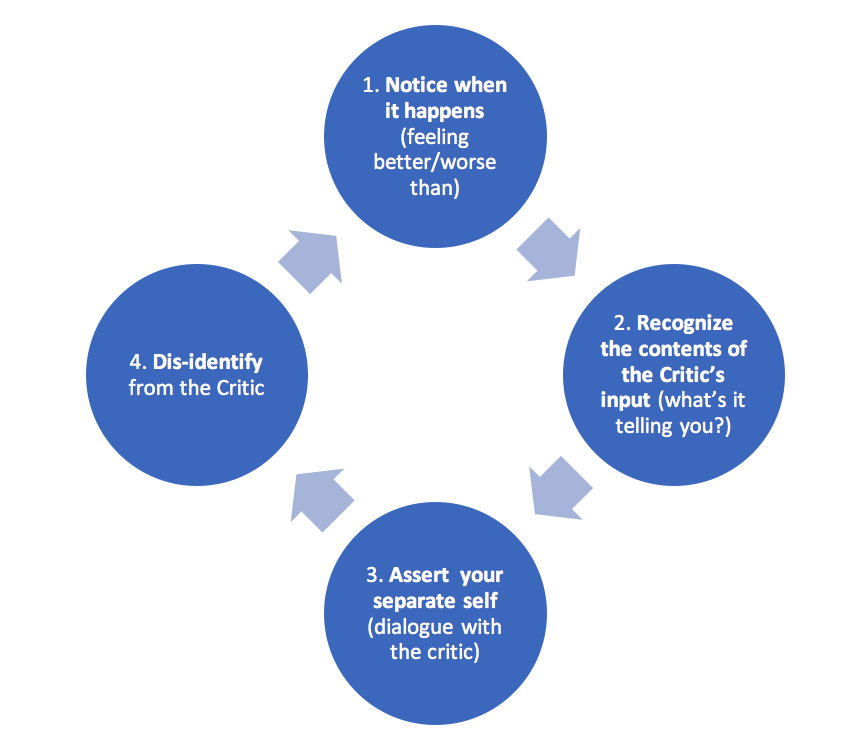
Do you often compare yourself to others in order to measure your worth in the world and the level of your achievements?
How’s that going?
We all do this to some extent. Sometimes you think you’re ahead and feel good, and other times you feel like you’re behind and feel not so good. Sometimes you feel you’re OK.
How do you value yourself?
Are you like a business, where you set metrics and measure yourself against them to know how you’re performing at life? Or do you instead, like most of us, have a loud voice in your head telling you when you are bad and sometimes good?
Writers and psychologists variously describe this voice as the Inner Critic, the Top Dog, the Doubting Twin. It’s the voice that tells you that you are not good enough, that you are not as good as ‘them’ (often an imaginary or hypothetical ‘them’) or that you are much better than ‘them’.
Does it interfere or help you?
Sometimes this inner voice can give you a helpful nudge to let you know that you could be doing things differently in ways that are to your advantage and that benefit our organisation. But mostly, the voice’s interjections are unhelpful and debilitating. Even when you are cheerfully telling yourself that you are better than someone, it’s often a veil of reassurance covering a suspicion that we aren’t as good a bunch of other ‘someones’.
How come?
One explanation offered for this tendency, that we all share, is that early experiences from our childhood left us wary of some situations. And even though we’ve left those situations far behind in the past and grown up to be autonomous and resourceful, part of us still believes that the threats are current. That part of us is trying to keep us safe by reminding us of the threats. It’s only trying to help, but it isn’t helpful. It’s trying to keep us safe. But we are no longer in the unsafe situation that the critic remembers.
Writer Steve Chapman says it’s like having an overtired toddler in your head.[1]
How can we make an ally of our Inner Critic?
The first suggestion I would offer is…cut yourself some slack. It’s in trying to develop some nurturing compassion for yourself that your inner critic can also be reassured and quietened.
Founder of Growing Edge, Simon Cavicchia (growingedge.co.uk) suggests this cycle[2] to bring our inner critic to be our ally:

The first challenge is to know when it’s happening. To help you spot when the voice that you’re listening to is that of your inner critic, notice, in the moment, when you are making comparisons of yourself with others; both negative (feeling ‘worse than’) and positive (feeling ‘better than’).
Then listen to what the critic is saying. What is the content of what the voice is telling you?
Next give some conscious consideration about what you actually want and then compassionately assert this. This will involve having a dialogue with your inner critic. It may seem a bit odd holding a conversation with yourself in your head. Tell your critic, ‘I know what it is you’re suggesting, and I know that it comes from a place of care, trying to keep me safe. But I want something else right now and that is what I’m going to do. It’ll be OK. You can relax’.
The last element involves dis-identifying with the deficiency that the critic is pointing out. ‘You’re telling me ‘this’ but I don’t identify with it. That’s not me, here and now’.
Over time and with careful, compassionate practice, you will start to hear your Inner Critic less often and less loudly. Then you can be yourself a little more freely.
[1] Steve Chapman. “D- This blog is not up to standard. Must try harder” – Investigating our Inner Critic
[2] Simon Cavicchia. October 2016. Workshop – Exploring the inner critic.




